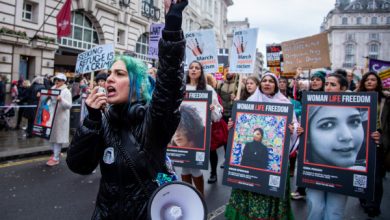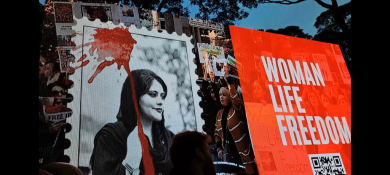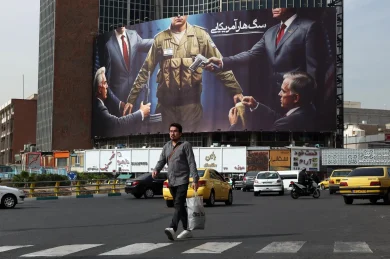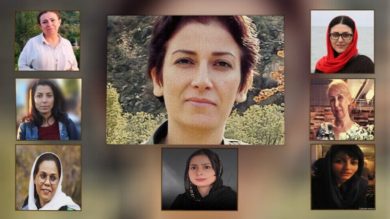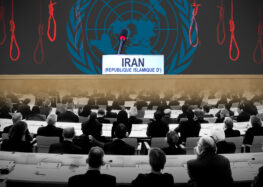In the heart of Iran’s authoritarian regime, a silent war is being waged behind prison walls. It’s a war of resilience, endurance, and resistance—led by women. These women are not criminals; they are students, journalists, mothers, lawyers, poets, and everyday citizens who dared to speak out. Their crime? Demanding dignity, equality, and basic human rights in a country where those ideals are violently suppressed by the Islamic Revolutionary Guard Corps (IRGC).
This article explores the harrowing reality faced by Iran’s political prisoners, focusing on the stories of courageous women who have been arrested, tortured, and silenced—yet continue to fight from behind bars. While international attention occasionally flares, the plight of these women remains largely in the shadows. Their voices must be heard.
1. The Machinery of Oppression: How the IRGC Targets Women
A System Designed to Silence Dissent
The IRGC operates as the enforcement arm of the Iranian regime, wielding immense power across military, political, economic, and judicial institutions. Its intelligence arm monitors, arrests, and interrogates activists and journalists, especially those who challenge the system’s gender-based oppression. Women who defy the compulsory hijab, protest for freedom, or amplify human rights abuses often find themselves detained without due process.
Charges such as “acting against national security,” “spreading propaganda,” and “insulting the Supreme Leader” are vague but carry severe consequences. These laws are routinely used to justify the imprisonment of women whose only real offense is speaking out.
2. Evin and Qarchak: Prisons of Pain and Resistance
Evin Prison: The Symbol of Repression
Evin Prison in Tehran is notorious for housing political prisoners. It is under the IRGC’s direct control and is synonymous with solitary confinement, torture, and psychological warfare. Many women political prisoners are subjected to months of isolation, denied medical care, and pressured to confess to crimes they did not commit.
Qarchak Prison: A Living Nightmare
Located in the desert southeast of Tehran, Qarchak is widely regarded as one of the worst women’s prisons in the world. Overcrowded and unsanitary, it houses both political and violent offenders. Women are exposed to unsafe conditions, harassment by guards, and physical abuse. Human rights groups have condemned the use of Qarchak for detaining political prisoners as inhumane and unlawful.
3. Voices of Courage: Stories of Women Behind Bars
Narges Mohammadi – The Unyielding Human Rights Defender
A prominent activist and Nobel Peace Prize laureate, Narges Mohammadi has spent years in and out of prison for her work advocating for women’s rights and against the death penalty. Despite facing brutal conditions and ongoing health issues, she continues to write, speak out, and inspire resistance from within Evin’s walls.
Sepideh Gholian – The Journalist Who Would Not Be Silenced
Arrested for covering labor protests, Sepideh has become a symbol of defiance. After facing torture and being forced into televised confessions, she bravely recounted her experiences upon release—only to be re-arrested. Her resilience continues to energize young activists across Iran.
Atena Daemi – The Voice for Children and Justice
Atena’s activism for children’s rights and against capital punishment led to her imprisonment, where she endured hunger strikes and solitary confinement. She remains a powerful voice, even in captivity, calling out the IRGC’s systematic abuse of women in detention.
4. Why Women Are Targeted
Women represent a unique threat to the regime’s power. Their visibility, voice, and defiance directly challenge the gender-based foundation of the Islamic Republic. By arresting female leaders and thinkers, the regime seeks to intimidate others from following their path.
The IRGC specifically targets women because:
• They challenge the mandatory hijab and state-enforced morality.
• They act as community leaders in movements for reform.
• Their voices carry weight both inside Iran and internationally.
5. Life Behind Bars: Conditions, Abuse, and Resistance
Women in Iran’s prisons face:
• Torture and physical abuse during interrogations.
• Sexual harassment and threats of rape as tools of control.
• Psychological torment through solitary confinement and threats to family members.
• Lack of healthcare, even for life-threatening conditions.
• Limited or no access to legal representation.
Yet, many continue to resist: organizing hunger strikes, sending letters to international organizations, and sharing coded messages of hope with the outside world.
6. The Forgotten Voices: Why Global Attention Matters
While the names of a few prominent prisoners make headlines, countless other women remain unknown. Teachers, students, environmentalists, and mothers have been detained in cities across Iran. Their names may never appear in a report, but their suffering is real.
International pressure has, in some cases, led to the release of prisoners or improved conditions. But more is needed. Iranian women prisoners are counting on the world not to forget them.
7. The Role of the Diaspora and International Community
The Iranian diaspora plays a key role in raising awareness about political prisoners. From organizing protests and lobbying governments to launching campaigns like #FreeIranianWomen, their advocacy keeps the spotlight on those behind bars.
Governments and international bodies must:
• Demand the release of all political prisoners.
• Impose sanctions on IRGC officials responsible for human rights abuses.
• Support legal and humanitarian aid for affected families.
• Provide digital tools and platforms to amplify prisoners’ stories.
8. What You Can Do
Even individuals can support the cause:
• Share the stories of imprisoned women.
• Follow and support organizations like Center for Human Rights in Iran and Amnesty International.
• Use hashtags like #FreeIranianWomen, #WomenLifeFreedom, and #BanIRGC to amplify awareness.
• Write to elected officials urging action on human rights in Iran.
Conclusion: Their Voices Will Not Be Forgotten
The women imprisoned by the IRGC are not victims—they are heroes. Their silence is not consent—it is a forced quiet that hides powerful defiance. Each woman behind bars represents the heartbeat of a growing movement that demands justice, freedom, and change.
Their courage fuels Iran’s fight for democracy. Their stories must be told. Their names must be remembered. And their freedom must be fought for—until the walls of injustice fall.
Join Our Newsletter!
Stay informed with the latest updates, news, and ways to take action in the fight for justice and global security. Sign up now to get updates delivered straight to your inbox!

